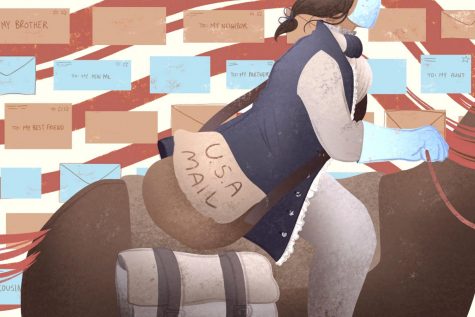By the people, for the people: Patriotism as a means to serve your neighbors
September 2, 2020

In a country fragmented by a two-party system, what does it mean to be patriotic? From debates on defunding the police to dissents over wearing masks, how can we support the nation as a whole, while our leaders are split on every political issue?
While the U.S. Constitution, Supreme Court rulings and even the flag have changed numerous times throughout history, one aspect of the country that has not wavered is the civic duty of the people to support their fellow Americans.
Protests
When the nation was founded, neighbors fought side by side to take down what they believed to be oppressive forces and measures, such as the Tea Act of 1773, and later rebelled against the U.S. government to lower whiskey taxes.
A few of the original rebellions are celebrated with holidays such as Independence Day, and because militias eventually turned into the U.S. military, those fighting forces are still honored now with Memorial Day and Veterans Day. Yet current acts of defiance are met with brutality.
The current protests over police violence are not to be taken lightly—they are demonstrations of pain, a public outcry for help. Consider the protests honored during Independence Day—the revolution of the U.S. colonies over British rule for disputes over money and basic liberties.
Though the protesters are marching in the streets, rather than tarring and feathering tax collectors, they are essentially speaking up for their rights, just as the colonists did.
Front Line Workers
If we are celebrating paid holidays and taking time off from school and work to honor people who go into battle for the U.S., then why is there no reverence for protecting each other’s rights on our own land?
The “front line” is a military term typically used to describe both the area of conflict and the line formed by the most advanced combat units on the field. It is now also used to describe the dangers essential public service workers face during the coronavirus pandemic.
Today’s front line workers are not rewarded with holidays and three square meals per day from the American government. There is, however, something the rest of us can do to protect them: wear our masks.
During World War II, citizens back home rationed gas and food. They collected scrap metal for armaments, and women made their way into the workforce.
Citizens made these sacrifices for the people forced to fight in some of the most dangerous locations in the world, like Nazi Germany.
The least we can do to support and protect the people currently forced into some of the most dangerous jobs in our country is wear a piece of cloth over our mouths and noses.
More than 183,000 people have died from the coronavirus in the U.S. as of publication Wednesday, Sept. 2, but many cannot stay home and quarantine because they have a financial necessity to work. As reported by the Associated Press, 13.6% of essential workers live below the poverty line.
The U.S. Postal Service
One front line industry, in particular, is in dire need of more than just health safety; it needs monetary and political help because its entire operation is being threatened—the U.S. Postal Service.
In 1765, the British Stamp Act charged a fee to the colonies for mailing newspapers and legal and commercial parcels, but this was quickly repealed in 1766 after much dissent.
When the revolution ignited, Benjamin Franklin began work as America’s first postmaster general in 1775.
In its 245 years, the USPS has grown to serve every address in the U.S., and it has become one of the largest employers across the country.
But despite the fact that increased government funding would help the USPS balance its finances enough to manage universal mail-in voting with greater ease, making the election season safer during the pandemic, President Donald Trump said he opposes additional funding because he thinks—despite evidence to the contrary—mail-in ballots will cause mass voter fraud.
The failure to fully fund USPS operations will cause continued delays and inefficiencies in services to the American people, and it could potentially create an imbalance in the election if certain vulnerable sects of the population are not able to safely go to polling locations and cannot reliably vote by mail.
Therefore, just as we need to protect essential workers with masks, we need to make sure everyone has a safe opportunity to vote during the 2020 election and protect the USPS by buying stamps and calling elected representatives to demand their continued support of this essential service.
Thankfully, due to recent backlash, Postmaster General Louis DeJoy said he is postponing cost-cutting measures until after the election, but public vigilance is the key to keeping the USPS around for another 245 years.
Look at your neighbors, coworkers and family members who are fighting for justice.
Revolutions did not die with the Revolutionary War—nor did patriotism. In a nation with leaders divided, we still have each other. Support your fellow compatriots in their modern fights for safety and justice.







